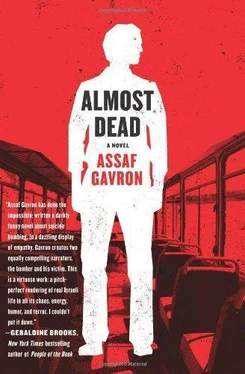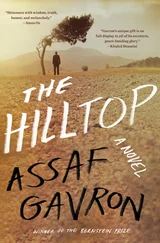We bought falafels and fruit shakes from the next stand, and sat on wicker chairs on the pavement. Hamelacha Street in the Rosh Haayin Business Park is not one of Israel’s most glamorous locations. ‘OK,’ I said, going over a print-out of Bar’s email, ‘Binyamin is the guy’s name. Shuli called the number, and he answered and said he was Binyamin. She asked him about Guetta and he hung up.’
‘You remember the date?’ asked Bar.
I certainly did. ‘A couple of days after Shaar Hagai.’
‘That fits. Maybe he got scared of Shuli’s call. But it’s only a guess.’
‘What about these B. Warshawskis?’
‘Well, it would make sense if it was one of the Tel Avivis,’ said Bar. ‘But it could be the Tel Mond one. Or maybe our Binyamin’s unlisted. Better do it carefully, if he cancelled his number. I’ll finish scanning the PalmPilot first. There’s a lot more in there.’
I took a bite from my falafel. Not too bad. Bar sounded as if he knew what he was doing. ‘Carry on, then,’ I said. ‘Send me a message, when you’ve got something to send.’
The spring and early summer had already begun to hammer the coast of Israel with heat. Those little gauntlet-runs from the air-con in the car to the air-con in the office to the air-con at home got more and more debilitating as the days passed, especially since one of the air-conditioners was in a ten-year-old car. Cold showers extended in length. We were all attached to our water bottles like drips. Hummus was off the menu. And public interest in the Croc waned. The phone rang infrequently now: a charity night here, a tribute there, a local newspaper from Rosh Haayin which’d discovered the thrilling fact that I was now earning my corn in their beautiful municipality, a local newspaper from Jerusalem (the local newspapers are blind to their subjects’ lack of civic affection) and, very occasionally, someone from the past, someone whose existence I’d forgotten, a voice that took me way back into the long ago.
It was shortly after Shuli’s death, during those exhausted, surreal, stifling days when looking for Guetta was apparently the only thing holding me together. I was still waking up well before dawn. I’d leave the flat and wander through parks and streets to meet my comrades in insomnia, sit on a bench and exchange a few words with them. So I was half asleep and driving to Tel Aviv in the crappy Peugeot at the end of the working day, with the sea in front of me and the Ramat Hasharon Tennis Centre on my left, when the phone rang. ‘Crocos?’ said a voice, and the crappy Peugeot suddenly metamorphosed itself into a time machine, taking me back, east, up to the hills above Rosh Haayin and farther, up to the cliff above the valley, up to the village. I could taste something bilious in my mouth, felt a burning in my throat and eyes. Gadi. Lieutenant Gadi Gidon. In short, Gadgid. How many years since I’d heard this voice? ‘Gadi.’ ‘Who else?’ ‘Years,’ I said. The time machine landed in the watchtower at the entrance to the village, opened its doors and turfed me out.
Gadgid is leading a platoon of soldiers on a routine patrol inside the village. A wide road winds from the entrance of the village to the top of the hill. Along its sides a few houses cluster sparsely, but the heart of the village is higher up, at the end of the road. There the alleys are narrower, and the houses crowded together. I’m in the watchtower at the entrance to the village. I watch the file of soldiers getting smaller as they make their way up the road, then disappearing at the top of the hill. Gadgid is walking point — tall, confident, tight black curls on his head, an impressive nose. When all the soldiers have disappeared from sight, I look around at the arid winter landscape. I sit down with my back to the wall and drink from my water bottle. 1988: curfew; intifada; morning; silence.
We met at Bar BaraBush. ‘Crocos! My God, you’re a star!’ Gadgid still held himself very straight and tall, but his formerly distinctive nose had disappeared somewhat into a fatter face, and the curls had gone. He had glasses. ‘You’ve become an intellectual, Gadi?’ I ordered my Cannibal and he got the beers in. I always liked Gadgid in the army because, like me, he didn’t take it too seriously. We became friends in Balata, where we watched Israel v. Colombia on a tiny black-and-white TV hooked up to a generator. Valderrama’s free kick through our joke of a wall, Yoram Arbel’s now-classic commentary, 1–0–and once again we weren’t going to the World Cup. Gadgid made me laugh the whole game, and I swear on my life that he said, ‘That’s no way to build a wall’ ten seconds before Arbel did.
‘You know,’ I said, ‘when you called, the moment I heard your voice saying “Crocos”, it was like I was there. Like I was touching the dirt, smelling the smell.’
‘The tear-gas smell, huh?’ He smiled. ‘That son of a bitch would have got what he deserved even without your contribution.’
I sit down and drink, and fall asleep. And the next thing I know is…I don’t know…shouts? My backside inexplicably getting warm? The whispering sound of flames? A stone landing next to me? A shot? I don’t know. I remember watching the soldiers disappearing over the top of the hill. I sit, I drink, and then…I look down and see that the tower is on fire. And twenty-five feet below there are…I don’t know how many, five, ten, a dozen of them. They see me and shout and start to throw stones. I whip my head back in. I can hear flames, shouts, the stones hitting. There’s a terrible smell of burning plastic and wood. I glance down again — a stone flies past my head. And they start to climb. It is utterly terrifying. I scramble over to the radio and call Gadgid with no code words, no military terminology or radio lingo. I scream, ‘Gadgid, come and save me!’ and he replies, ‘We see. On our way.’ I curl up in the corner, my head buried in my hands. I’m starting to hyperventilate, and I don’t want this, no, no, no, no, no, and there’s a shot and another and the shots are coming thick and fast now and yelling and the sound of blows. And my head deep, deep, deep between my knees in the corner.
I was drinking vodka and passion fruit, trying to get a grip of the elusive seeds with my tongue and keeping an eye on the big tits of the girl on the other side of the bar. A ring of smoke sidled out of Gadgid’s mouth.
‘So tell me again. How did you manage to let them burn the tower like that?’
‘I don’t have a clue.’
Fifteen years later, I still don’t have a clue and I never will have. But I do know this: the same day my close friend from Jerusalem, Danny Lam, was driving a jeep on a patrol in the central section of Lebanon’s security zone. At 11 a.m., when I was sitting in the burning tower waiting for my end, his jeep arrived at a puddle that may possibly have been deeper than it looked, and stopped in front of it. I’ve relived this moment many times: me, on my own, in a burning watchtower in a West Bank village. Danny Lam and his friends, in a jeep in Lebanon, on the edge of a big puddle. And up above, God choosing which button to hit.
‘God, Crocos, what a fuck-up! A whole regiment had to come in after us to restore order, no?’
‘Yeah…I’d almost blanked it out, and suddenly you turn up from the past. Where did you come from?’ I said.
It was late and he’d already drunk several pints. He told me his war stories and the history of his life since, his marriage, his success as a chemistry student at the Haifa Technion, his divorce, and his work at the Weizmann Institute in Rehovot alongside attractive twenty-something researchers from the former Soviet Union.
After we said goodbye I got into the car and started driving, but I didn’t go home, I drove just to drive, to think. I drove slowly in no particular direction, down near the beach, around squares and roundabouts, slowly, directionless, drowned in memories. I drove like that for a long time, thought about what I’d done and not done and tried to put work and Duchi and home and all that on the other side of the balance. What could I have done? Who could have guessed that Gadgid would call all of a sudden?
Читать дальше












